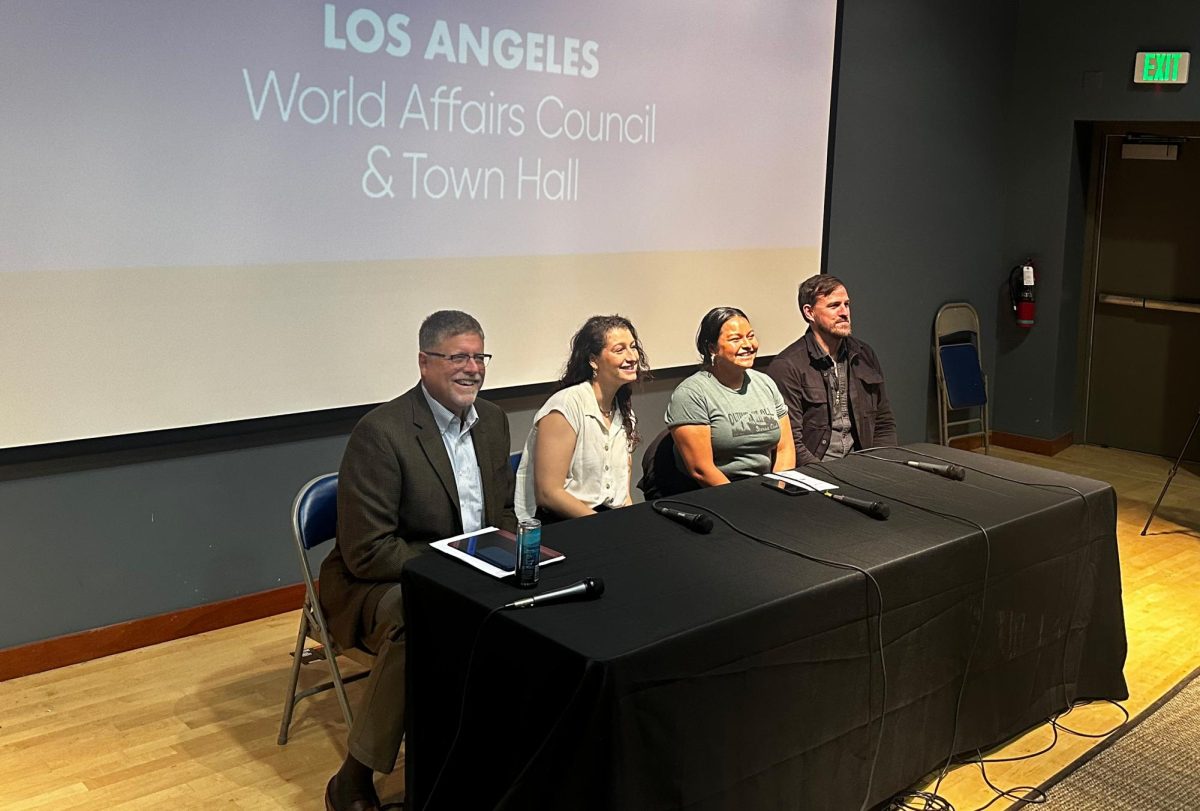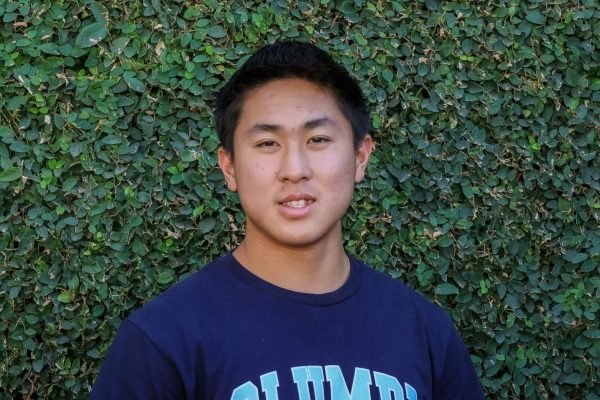The Global Affairs Society, co-led by Assistant News Editor Nathan Wang ’25 and Assistant Features Editor Alex Dinh ’25, participated in a Los Angeles World Affairs Council and Town Hall (LAWACTH) event at the LA Zoo on Oct. 13. Members joined other high schools to learn more about initiatives and organizations in Southern California dedicated to addressing local and worldwide climate change and environmental conservation.
The event featured four panelists — Dr. Eric Strauss, Dr. Jake Owens, Kim Orbe and Emily Parker — each with a different background in conservation and climate change.
Strauss, who currently serves as the President’s Professor of Biology at Loyola Marymount University (LMU) and the Executive Director of the Center for Urban Resilience, started the event by addressing the events unfolding in the Middle East and said they may have connections to broader climate change.
“The impact of humanity cannot be overstated,” Strauss said. “I know today, we arrived with heavy hearts thinking about more conflict that’s happening in the Middle East right now. Although there are many causes for these kinds of conflicts, underlying all of them are the challenges of access for humans to the resources they need. That access is complicated by inequality, but it’s also complicated by climate change. We’re living in a world right now, where the population centers are in areas where the climate is shifting so rapidly, that the resources that were easily accessed, are not available.”
The other panelists spoke about their backgrounds in environmental activism and research. Parker works as a marine scientist at Heal the Bay, an organization dedicated to preserving Southern California waters and raising awareness about climate change.
Parker said her path to becoming a marine scientist was atypical.
“[My path to being a marine scientist] was really circuitous,” Parker said. “In my undergraduate studies, I ended up getting an Environmental Studies degree, and [although it] was rewarding, it was also very exhausting. I reached a point where I was burned out, and eventually I ended up in Costa Rica, working on a bunch of different conservation projects. I was very lucky to have done that to work, and a couple years later, I ended up going back to school to finally refocus on marine science and conservation.”
Parker said a large element of her work has been lobbying with governmental bodies to advocate for policy.
“I’ve worked on ideas like banning single styrofoam and single-use plastic utensils,” Parker said. “I’ve also worked on some really cool laws here in Los Angeles, some of which you may have even noticed in the past couple of years. If you’ve gone to a Starbucks in certain areas of Los Angeles County, and they wouldn’t give you a straw, you had to ask for one? That was a law that I worked on. If you’ve been to restaurants in certain cities that give you fiber-based compostable materials, those are all laws that I’ve worked on.”
Owens, now the director of conservation at the LA Zoo, received his Ph.D. in environmental science and has done research on endangered animals worldwide. Owens said he is finding ways to contribute to conservation around the world.
“The most important thing for conservation is the people,” Owens said. “How do we engage more people now when we have to, since it’s more pertinent than ever to deal with the size and scale of the crises? And so I said, ‘The LA Zoo gets 1.8 million people here, how do we use it as a resource for conservation? How do we then take the ticket sales when they’re coming in to fund conservation work around the world?’ We have animals here and we take care of them, we do the best job we possibly can to take care of them. Then on the other side, people come in to see them, they pay and give us donations which we then turn into conservation work.”
Owens said he strives to educate future generations to care more for their environment.
“The [next] generations are going to feel the effects of climate change more than any other generation before us,” Owens said. “[They’re] going to be the ones that are tasked with coming up with better solutions than the previous generations. [Members of the panel] want to make sure that you all have the resources, the skills and the abilities, so that you can actually do that work and you can build upon the work that’s been done before. That’s why the zoo and I started a paid internship program and a Teen Council for conservation which is again paid for high school students from underrepresented communities in Los Angeles. What’s absolutely essential is that the generation now who’s going to be dealing with these things is equipped to actually mitigate them, reduce them and have solutions going forward.”
Club member Micah Parr ’25 said the event provided a greater insight on global affairs issues regarding the environment and climate.
“I learned there are a lot of processes and complexity to the environment,” Parr said. “If it wasn’t complex, we would have been able to solve it really quickly. I thought global affairs was much more like politics, rather than science or the environment, but obviously [the environment] is also very much going to be one of the big issues defining our future. As we grow up, we’re going to have to face this as our kids are going to have to face this. Who knows, our great-great-grandkids might not even have a future because of this. It’s something that needs to be addressed.”






























